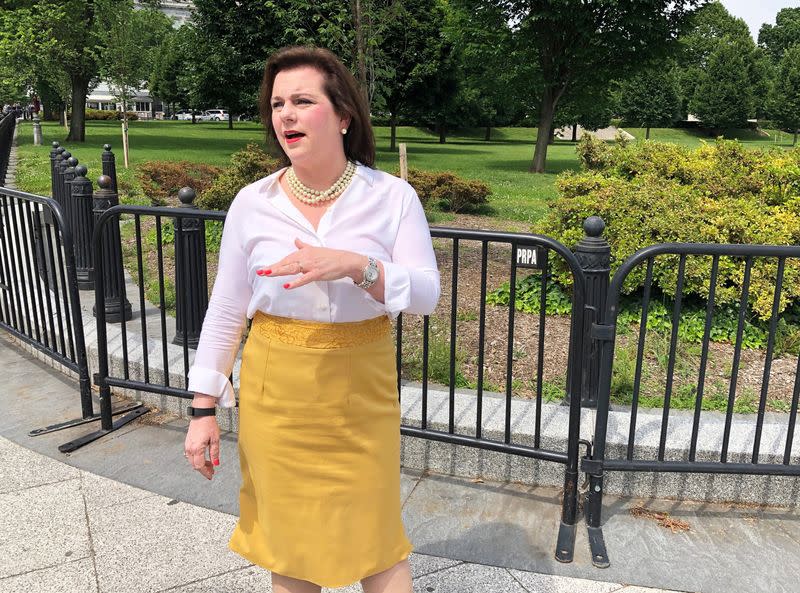Social conservatives push Trump to back federal role on abortion

By James Oliphant and Nathan Layne
WASHINGTON (Reuters) - A leading U.S. anti-abortion group on Tuesday warned Republican presidential candidate Donald Trump not to water down language in the party platform on abortion restrictions, the most visible sign yet of a widening fissure between Trump and social conservatives on the issue.
The reproach by Susan B. Anthony Pro-Life America president Marjorie Dannenfelser comes as party members head to Milwaukee to draft the platform, which serves as a statement of policy principles, ahead of what is intended to be a national show of unity at the party's convention this month.
For weeks, anti-abortion activists have been expressing concerns that the Trump campaign and the Republican National Committee would work to weaken language in the platform by eliminating any reference to a federal role in restricting abortion.
Trump has said the issue should be left solely to state legislatures in the wake of a U.S. Supreme Court decision in 2022 that gutted constitutional protection for the procedure. He has argued that is a more politically tenable position, with polls showing a majority of Americans broadly backing abortion rights.
In a statement on Tuesday, Dannenfelser said the longtime, battle-tested alliance between the grassroots anti-abortion movement and the Republican, or GOP, Party was in jeopardy.
"If the Trump campaign decides to remove national protections for the unborn in the GOP platform, it would be a miscalculation that would hurt party unity and destroy pro-life enthusiasm between now and the election," Dannenfelser said.
Members of the Republican Party's platform committee are scheduled to meet privately in Milwaukee ahead of the July 15-18 convention, where Trump will be formally tapped as the party's presidential nominee for the Nov. 5 election against President Joe Biden, a Democrat who is campaigning in favor of abortion rights.
In her statement, Dannenfelser suggested that anti-abortion groups were being shut out of the process of crafting the platform.
"We are now just two business days away from the platform committee meeting and no assurances have been made," she said. "Instead, every indication is that the campaign will muscle through changes behind closed doors."
Danielle Alvarez, a spokesperson for the Trump campaign, said no definitive decisions had been made on the platform's contents.
"The platform committee has yet to convene to discuss what language should be in the final document," Alvarez said. She did not respond to questions about whether the anti-abortion groups have a say in the process.
EVANGELICAL PRESSURE
Last month, a bevy of anti-abortion advocates, including prominent evangelical Christians such as Ralph Reed and Tony Perkins, sent a letter to Trump sharing concerns similar to Dannenfelser's.
They called on the campaign to ensure that language be retained in the platform that explicitly says a fetus has a "fundamental right to life which cannot be infringed." They have also urged passage of federal legislation to grant protection to fetuses under the 14th Amendment of the Constitution, which outlines the rights of U.S. citizens, and want a further so-called "human life amendment" added to the Constitution.
Perkins, the president of the Family Research Council who served as an evangelical adviser to Trump's administration, has launched an online "platform integrity project" to apply grassroots pressure to Trump and party leaders to keep the current abortion language.
A member of the RNC platform committee, Perkins sent a letter to RNC Chair Michael Whatley on Monday complaining that advocates and the media would be shut out of the platform deliberations under a "gag rule" imposed by the party.
"The RNC Gag Rule heightens speculation that the GOP platform will be watered down to a few pages of meaningless, poll-tested talking points," Perkins wrote.
The Trump campaign in a memo last month to the platform committee urged that it boil down the document to a statement of basic tenets absent of "Washington jargon" and the "shackles of lobbyist influence."
While Trump relied on strong support from evangelicals during the Republican nominating contest, he has consistently maintained that an extreme stance on abortion hurts the party's electoral chances and has frowned upon six-week bans like those passed by states such as Florida.
He has argued that his appointment of three Supreme Court justices who voted to overturn the seminal abortion case Roe v. Wade stands as proof of his anti-abortion bona fides.
(Reporting by James Oliphant and Nathan Layne; Editing by Colleen Jenkins and Rosalba O'Brien)


